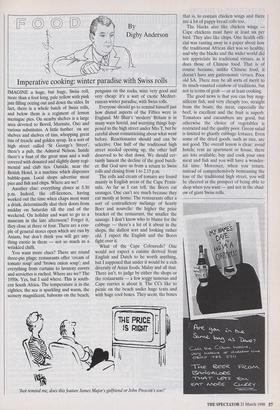O
•
By Digby Anderson
Imperative cooking: winter paradise with Swiss rolls
IMAGINE a huge, but huge, Swiss roll, more than a foot long, pale yellow with pink jam filling oozing out and down the sides. In fact, there is a whole batch of Swiss rolls, and below them is a regiment of lemon meringue pies. On nearby shelves is a large area devoted to Bovril, Marmite, Oxo and various substitutes. A little further on are shelves and shelves of tins, whopping great tins of treacle and golden syrup. In a sort of high street called 'St George's Street', there's a pub, the Admiral Nelson. Inside there's a bust of the great man and a wall covered with donated and slightly dusty regi- mental and club ties. Outside, near the British Hotel, is a machine which dispenses bubble-gum. Local shops advertise meat pies and fish and chips. Where are we? Another clue: everything closes at 5.30 p.m. Indeed, the off-licences, having worked out the time when chaps most want a drink, determinedly shut their doors from midday on Saturday till the end of the weekend. On holiday and want to go to a museum in the late afternoon? Forget it, they close at three or four. There are a cou- ple of general stores open which are run by Asians, but don't think you will get any- thing exotic in them — not so much as a wrinkled chilli.
You want more clues? There are round three-pin plugs; restaurants offer 'cream of tomato soup' and 'brown onion soup'; and everything from curtains to lavatory covers and serviettes is ruched. Where are we? The 1950s. Yes, but I said where. This is south- ern South Africa. The temperature is in the eighties, the sea is sparkling and warm, the scenery magnificent, baboons on the beach, penguins on the rocks, wine very good and very cheap: it's a sort of exotic Mediter- ranean winter paradise, with Swiss rolls.
Everyone should go to remind himself just how dismal aspects of the Fifties were in England. Mr Blair's 'modern' Britain is in many ways horrid, and worrying things hap- pened to the high street under Mrs T, but be careful about romanticising about what went before. Reactionaries should and can be selective. One half of the traditional high street needed opening up, the other half deserved to be shut down. We should cer- tainly lament the decline of the good butch- er. But God save us from a return to Swiss rolls and closing from 1 to 2.15 p.m.
The rolls and cream of tomato are found mainly in English areas of the Cape Penin- sula. As far as I can tell, the Boers eat sausages. One can't see much because they eat mostly at home. The restaurants offer a sort of contradictory mélange of hearty Boer and nouvelle: the higher the price bracket of the restaurant, the smaller the sausage. I don't know who to blame for the cabbage — there's a lot of it about in the shops, the dullest sort and looking rather old. I expect the English and the Boers fight over it.
What of the Cape Coloureds? One would not expect a cuisine derived from English and Dutch to be worth anything, but I supposed that under it would be a rich diversity of Asian foods, Malay and all that. There isn't, to judge by either the shops or the restaurants — a few soggy samosas and Cape curries is about it. The CCs like to picnic on the beach under huge tents and with huge cool boxes. They seem, the boxes `Just remind me, does this feature James Major's girlfriend or John Prescott's son?' that is, to contain chicken wings and there are a lot of pappy bread rolls too.
The blacks also like chicken wings Cape chickens must have at least six per bird. They also like chips. One health offi- cial was ranting away in a paper about how the traditional African diet was so healthy, and why the blacks and the wider world did not appreciate its traditional virtues, as it does those of Chinese food. That is of course because, unlike Chinese food, it doesn't have any gastronomic virtues. Poor old SA. There may be all sorts of merit to its much-vaunted rainbow of traditions, but not in terms of grub — or at least cooking.
The good news is that you can buy mag- nificent fish, and very cheaply too, straight from the boats; the meat, especially the beef, is excellent and the fruit is superb. Tomatoes and cucumbers are good, but otherwise the choice of vegetables is restricted and the quality poor. Green salad is limited to ghastly cabbage lettuces. Even some of the dried goods, such as rice, are not good. The overall lesson is clear: avoid hotels; rent an apartment or house, there are lots available; buy and cook your own meat and fish and you will have a wonder- ful time. Moreover, when you return, instead of comprehensively bemoaning the loss of the traditional high street, you will be cheered at the prospect of being able to shop when you want — and not in the shad- ow of giant Swiss rolls.




































































 Previous page
Previous page